Inherent Vice by Thomas Pynchon '59 (Penguin)
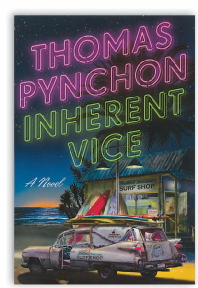
Inherent Vice by Thomas Pynchon '59 (Penguin)
When an ex-girlfriend asks Pynchon's hippie private eye hero, Larry "Doc" Sportello, to track down her missing lover, a wealthy real estate developer, Doc discovers a tangle of conspiracy, greed, and murder. Doc isn't cast in the same mold as Philip Marlowe. Insight comes to him as often from smoking dope as from tracking down clues on the mean streets of Los Angeles. The action takes place in early 1970, soon after the Charles Manson murders; Los Angeles is still the "great wrong place" of noir fiction. Despite the atmosphere of corruption, Pynchon's affection and nostalgia for the counterculture shine through in his most accessible novel to date.
Wherever There's a Fight by Elaine Elinson '68 and Stan Yogi (Heyday). Taking their title from Tom Joad's speech near the end of Steinbeck's The Grapes of Wrath, the authors chart the history of California's rocky path to social justice. Elinson, a former editor of the ACLU News, and Yogi focus on cases of discrimination against Chinese immigrants, the blacklisting of the "Hollywood Ten" during the McCarthy era, Ferlinghetti's publication of Allen Ginsberg's poem "Howl," the struggle for workers' rights, and the internment of Japanese Americans during World War II.
Psychology and Selfhood in the Segregated South by Anne C. Rose '72 (University of North Carolina). The history of psychological inquiry in the South during segregation, writes Rose, professor of history and religious studies at Penn State, "leads away from resolution rather than toward it." Advances in psychology at the beginning of the twentieth century emerged at the same time as Jim Crow laws. "Although nearly everyone involved in the transmission of psychological knowledge meant well, their science stopped short of painful honesty about the inhumanity in their midst. Their instinct to look away compels our own reflection.
China's Great Train by Abrahm Lustgarten '96 (Holt). China completed the railroad from Beijing to Lhasa in 2006, fulfilling a fifty-year plan and expanding its power over Tibet. Building the line presented great physical obstacles: the high Tibetan plateau contains the world's largest amount of sub-Arctic permafrost, which can undermine the railway track when it melts, and workers died of altitude sickness and exposure. Lustgarten, a contributing writer for Forbes magazine, was the first western reporter to portray the building of the railroad. He tells how the Chinese surmounted technological problems and examines the effect of the railroad on the culture and economy of Tibet.
Why America Fights by Susan A. Brewer, PhD '91 (Oxford). In 1917, Senator Hiram Johnson said, "The first casualty when war comes is truth." Brewer, a professor of history at the University of Wisconsin, Stevens Point, examines propaganda in six conflicts over the last hundred years, from the war in the Philippines through the Iraq War. "As long as propaganda assumes that people cannot handle the truth, it leaves Americans to wonder why they fight."
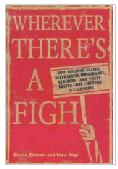
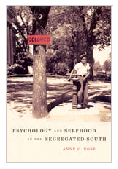
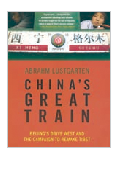
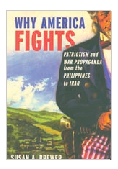
Recently Published
Fiction
Tracktown Summer by Elizabeth Holmes, MFA '87 (Dutton). Jake has felt lost since his parents separated, but his spirits lift at the thought of spending the summer with his father at a lake cottage. Yet he finds himself friendless until he meets Adrian, who is impulsive and reckless. As the summer develops, Jake sees the dysfunction in his friend's family and begins to put his own life in perspective.
I'm So Happy for You by Lucinda Rosenfeld '91 (Back Bay). Wendy and Daphne seem the best of friends. But when Daphne suddenly becomes more successful, Wendy tries to sabotage her friend's newfound happiness.
Non-Fiction
The Secret Lives of Boys by Malina Saval '95 (Basic Books). "If we want to know our boys," writes freelance journalist Saval, "we must engage them in ways that prove we are truly interested in what they have to tell us, not just what we think we want to hear."
The People Factor by Linda J. Bilmes and W. Scott Gould '79 (Brookings). Gould, a vice president for public sector strategy at IBM Global Business Services, and his co-author argue that the Civil Service is hobbled with an outdated management structure and describe a plan for reform.
Professional Expression by M. Dan Morris '44, BA '76 (Momentum Press). Drawing on his experience as a writer, editor, and teacher, Morris gives examples that help students and professionals communicate their ideas effectively.
Ithaca—the city, gorges, and colleges by Liz Bauman '73 and Tony Ingraham '69 (Owl Gorge Productions). Local writers and photographers Bauman and Ingraham portray the unique beauty and spirit of Ithaca in words and more than 200 pictures.
Performance Management by Gary Cokins '71 (Wiley). The global product marketing manager for the business intelligence firm SAS demonstrates how to improve results by integrating strategy maps, customer analysis, lean management, and other methodologies.
Reflections of the Shadow by Jeffrey Hirschberg '89 (Michael Wiese Productions). Memorable heroes and villains make the difference in getting a screenplay accepted. By analyzing several classic films, a screenwriter and director of the Television and Film Arts program at Buffalo State College demonstrates how to give each character a unique voice.
Thinking Through the Mothers by Janet Beizer '74 (Cornell). Modern biographies of women often fall into the trap of "salvation" contends a professor of Romance languages and literature at Harvard. She posits an alternative approach that avoids nostalgia in representing their lives.
The Hole in Our Gospel by Richard Stearns '73 (Thomas Nelson). American Christians should be more concerned for the world's poor, argues the president of World Vision US.
Golfing with Your Eyes Closed by Erin Macy and Tiffany Wilding-White '00 (McGraw-Hill). Two sports psychology consultants show how visualization techniques can improve your game.
The Widows' Might by Vivian Bruce Conger, PhD '94 (NYU). By analyzing wills, letters, and court records, an associate professor of history at Ithaca College explains how widows in early America were able to transcend rigid gender roles.
Lost and Found by Kate St. Vincent Vogl '87 (North Star). A writing teacher describes the emotional experience of letting her birthmother into her life.
Fiber Gathering by Joanne Seiff '95 (Wiley). Traveling to fiber festivals around the United States, a knitwear designer discovers new ideas for knitting, crocheting, spinning, and dyeing.
The Sopranos by Dana Polan '75 (Duke). "Everyone wants a piece of 'Sopranos' action," argues a professor of cinema studies at NYU in his exploration of the HBO series's influence on American popular culture.
A Weed by Any Other Name by Nancy Gift, PhD '02 (Beacon). "Perhaps weeds aren't so bad after all," writes Gift, acting director of the Rachel Carson Institute at Chatham University, who explores suburban lawns and shows weeds, these "plants out of place," in a new light.
Live Nude Cats by Aaron Weiss '03 (Kensington). A comedy writer and screenwriter features his two cats in a parody of tabloid news.


